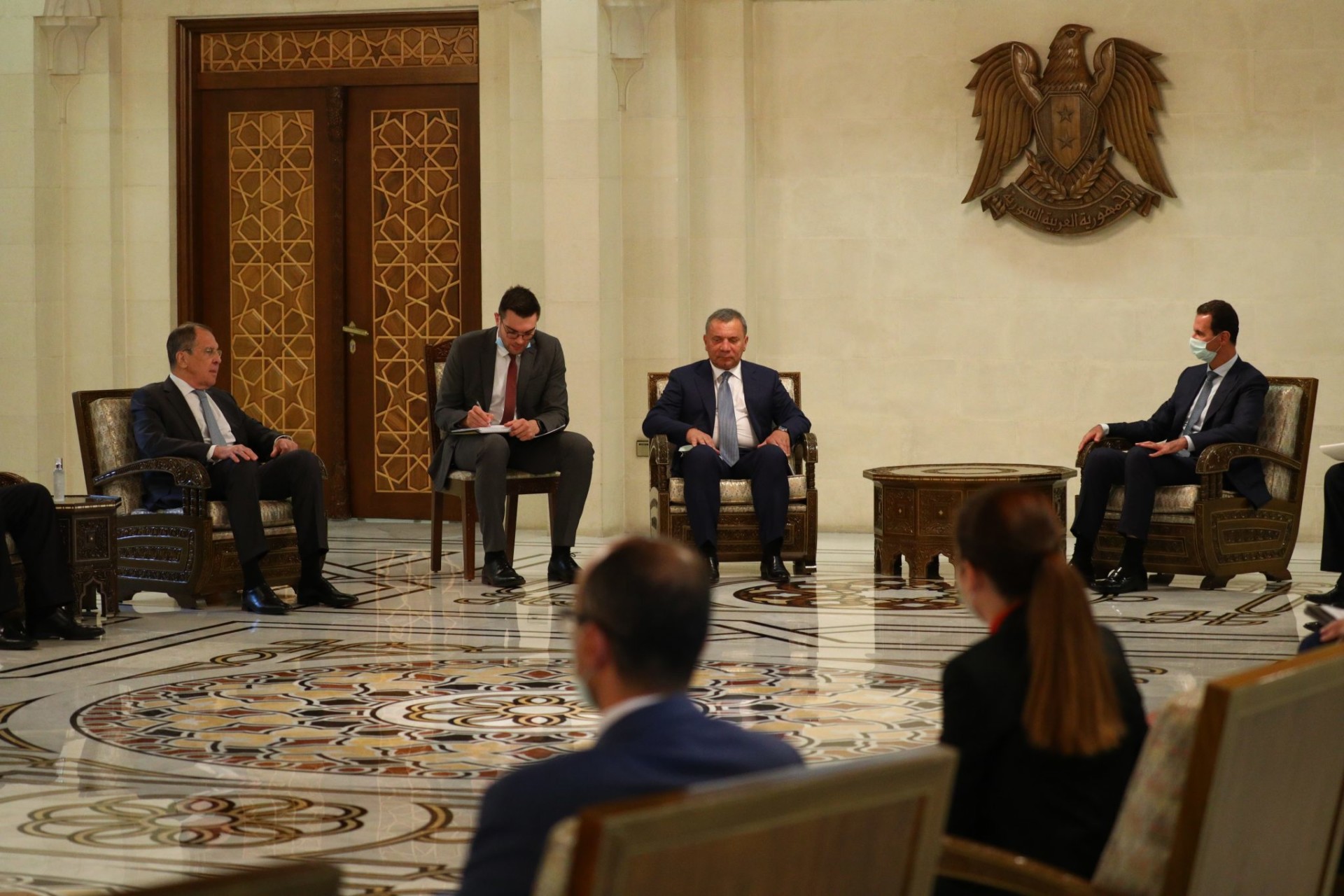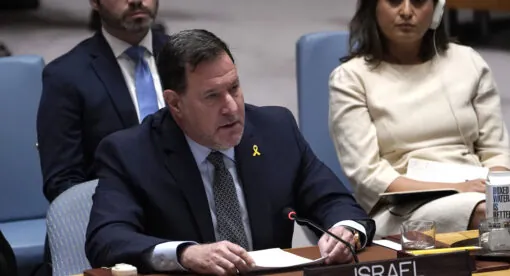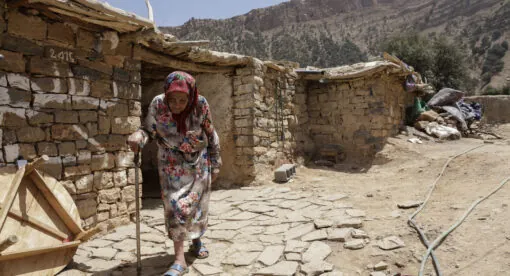Editor’s Note: This insider account was written under a pseudonym as the source did not wish to be identified by their real name for safety reasons. The Newlines Institute will occasionally publish analyses from such sources to protect their identities. The views expressed in this article are those of the author and not an official policy or position of the Newlines Institute.
After the United Arab Emirates announced a normalization accord with Israel, a video circulated on social media that might reflect thinking in Damascus about the matter. In the video, senior Baath Party member Mehdi Dakhlallah told state-run al-Ikhbariya TV, “Syria will leave the Axis of Resistance if there is a Russian-American consensus and if the state of Palestine is established.” He then quickly added, “I think this is very close.”
The interview is three years old, but pro-regime activists have been sharing it widely over the past week, mirroring what seems to be on everybody’s mind in Syria nowadays: possible peace talks with Israel. The video was apparently dug up from the state television archive and shared in regime circles. Pro-regime figures have reacted positively toward the statements. Dakhallah, also a former information minister, starkly contradicts what Hezbollah Secretary-General Hasan Nasrallah has often said: that the Axis of Resistance will not rest until the state of Israel is annihilated.
The recent circulation and reactions to the senior Baath Party official’s statements align with the posturing in Syria lately.
The Only Way Out
Indicative of the positive response to the remarks is the absence of condemnation of Dakhallah, who would otherwise be accused of treason for contradicting Nasrallah and the Axis of Resistance. Inside regime-controlled Syria, many ordinary people seem to be hoping, even praying, that a peace process kicks off in whatever form, whether under American, Russian, or Emirati supervision. They see this scenario as the only way out for their decade-long conflict and external pressure.
As talk of peace resumes throughout Syrian political circles, the Syrian regime recently issued new legislation rationing state-subsidized bread at four loaves per person per day, unable to feed its own citizens. Meanwhile, photos have gone viral on Facebook and Twitter of horrifying queues at Syrian gas stations, a sign of the economic paralysis and the inability of the government to address the growing problems. Those stations are being manned by soldiers with guns, often resorting to gunfire to quiet an angry crowd. The Syrian lira continues to plummet against the American dollar, now trading at 2,200 lira. That sharp and quick devaluation has eroded what remains of people’s razor-thin savings, sending many into bankruptcy. Then came the COVID-19 lockdown in midyear, which destroyed the few businesses that were still operating in Damascus. The little foreign investment that came with the 2018 capture of East Ghouta has all come to a grinding halt due to an unwelcoming business environment controlled by militias, topped with the U.S. Caesar Act, which has scared off even Russian and Chinese investors.
These economic hardships explain why ordinary Syrians are hoping that peace will improve their living conditions. The chatter in regime circles in Damascus is that if peace is signed, the Syrian regime would regain the Golan Heights in name only, renting it out to Russian real estate developers, just like they did with the port of Tartus.
Early Indicators
Reflecting these attitudes, the Syrian government has made a few signals that it might be open to peace talks. The loudest indicator is its muted response to the UAE-Israeli agreement announced in August and the subsequent Israeli normalization deal with Bahrain. Syrian state television has been silent about the events, and so has the Ministry of Foreign Affairs. That is in sharp contrast to how they acted when the Oslo Accords were signed by the Israelis and the Palestinians in 1993, followed by the Israel-Jordan Peace Agreement of 1994. In both cases, Syrian state-run media launched ferocious campaigns accusing both Yasser Arafat and King Hussein of selling out the Palestinians. The state mobilized thousands of schoolchildren to the streets, torching the flag of Israel – much like what happened recently in Gaza and within the Palestinian camps of Lebanon.
After the recent agreements, however, nothing of the sort happened in Syria, even though it would make sense for the regime to try to distract from the convoluted economic and political problems it has been facing. The only criticism was voiced generically and perfunctorily by the Baath Party.
Equally important, amid chatter of possible peace, Lebanon’s ex-foreign minister Gibran Basil made a public statement Sept. 12 that Hezbollah was “considering” a withdrawal from Syria. Such a withdrawal would be mandatory for any political process, and Basil is a staunch Hezbollah ally who would not have spoken casually about such a critical issue. ِIndeed, on the ground, there are some indications that this scenario may come to pass, including authorities taking down Hezbollah iconography in the Damascus neighborhood of Bab Touma and refusing to echo Iran’s line on the UAE deal. These steps have been ongoing and microscopic, like refusing to implement long-standing deals with Iran, such as that for a third GSM operator or giving Tehran the right to export phosphates (agreed upon back in January 2017).
Meanwhile, UAE support for Syria has continued undaunted, with two planes of humanitarian aid reaching Damascus in August and September. The UAE embassy remains open, represented by charge d’affaires Abdul Hakim al-Nuaimi, who last year described President Bashar al-Assad as a “wise leader.” Bahrain also has a diplomatic presence and its foreign minister last year was caught on camera embracing his Syrian counterpart, Walid al-Mouallem, at the United Nations.
A Stalled Syrian-Israeli Process
While the last U.S.-led effort to mediate between the Syrians and the Israelis was in 2011, the last public, high-profile talks were held in 2008. Those talks were indirect and carried out under Turkish mediation during the apex of the Syrian-Turkish honeymoon. They were aborted after a series of setbacks, starting with the replacement of Israeli premier Ehud Olmert with Benjamin Netanyahu and the suspension of Turkish-Israeli relations over Israel’s raid of the Freedom Flotilla in 2010. Then came the Syrian conflict of March 2011, which brought Syrian-Turkish relations to an abrupt halt.
Those were just the latest setbacks in a peace process that has lasted almost 30 years. Syria joined the Madrid Peace Conference of 1991 after participating in the U.S.-led war to liberate Kuwait. U.S.-sponsored peace talks continued for a decade, bringing Syrian President Hafez al-Assad to Geneva in 1991, U.S. President Bill Clinton to Damascus in 1994, and then both Clinton and Assad to Switzerland in March 2000, three months before Assad’s death. Those talks famously brought then-Foreign Minister Farouk al-Shara in face-to-face negotiations with Israeli Premier Ehud Barak and then-Chief of Staff Hikmat al-Shihabi to the White House, where he met with his Israeli counterpart Amnon Shahak. They too amounted to nothing, however, due to Assad’s insistence that there would be no peace or normalization before Israel withdrew to the 1967 borders, restoring the Golan Heights in full to Syria. Logically, this is where the new talks will likely begin.
Syria, the UAE, and Egypt have set up a security committee to coordinate policy in Libya, where they all support Field Marshal Khalifa Haftar against the Turkish-backed premier Fayez al-Sarraj. They are now also reaching out to Aguilla Saleh, the head of parliament, whose initiative is gaining momentum. Since December 2019, Syria has been sending fighters to join the UAE-backed offensive against Tripoli, rewarding the recruiter, Muhanna Nasser, with a parliamentary seat earlier this summer. They are also focused on preventing Turkish president Recep Tayyip Erdogan from grabbing more land in the Syrian north. These Arab states undoubtedly would all benefit from a regime in Damascus that is seen as joining the peace process with Israel – one that would make Bahrain and the UAE seem less odd in the family of Arab nations.
According to insider regime accounts, the topic was briefly revisited by Russian President Vladimir Putin, behind closed doors and very informally, after the Kremlin formally entered the Syrian battlespace in September 2015. Putin had considerable influence in both Israel and Syria, with a personal influence over Netanyahu and Bashar al-Assad. He used it to broker an agreement in the Syrian south in 2018, making sure that Israel’s interests were safeguarded and Hezbollah was pulled away from the Syrian-Israeli border.
Whether Putin takes that influence to the next level remains to be seen. And it is unclear whether these talks, if confirmed, would be approved by the Americans, especially ahead of the November elections. Putin might have legitimately inherited the peace process from the United States – or simply snatched it. He certainly has plenty of room to cooperate with the UAE, which shares an unstated objective with the Russians of clipping Iran’s wings in Syria, limiting Turkey’s expansionism, and legitimizing the Syrian regime. For example, in an April phone call between Assad and Emirati Crown Prince Mohammed Bin Zayed, ostensibly to coordinate action against the spread of COVID-19, the crown prince urged the Syrian president to jumpstart a military offensive in the Syrian northwest, targeting Turkey’s proxies in Idlib.
The Syrian regime has been heavily battered. The Russians can continue to help it expand its writ (however weak) back into the areas it lost in the eastern half of the country. But what it needs more immediately is to steer away from political and economic meltdown, and here is where it hopes to benefit considerably from the UAE’s support and the normalization process with Israel. The challenge for Assad is to balance this imperative with his relationship with the Iranians and then hope the United States will react to such efforts to rehabilitate the Assad regime through a serious peace process with Israel.





